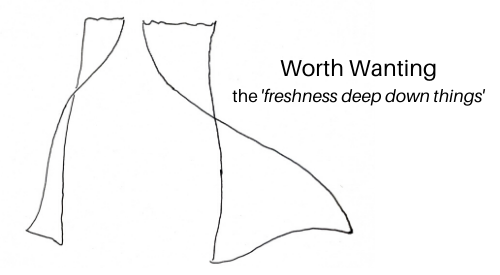
I ask myself if freshness as presented here is best approached through religion or spirituality. The answer: neither; freshness is best approached in friendship.
None of these three terms is incompatible with each other, indeed, we can think of them as three aspects of a full response to transcendence.
The root of the word religion means to bind, presupposing transcendent reality as an cosmic order we put ourselves into proper alignment with by adhering to a set of propositions and practices.
The heart of the word spirituality is in the idea of breath, presupposing transcendent reality as a pervasive substantiality we merge with by breathing it in and out.
The core idea of friendship with freshness is mutuality, presupposing transcendent reality as an agency ready to be playmate and confidant, a bosom buddy.
Freshness, bosom buddy? This needs to be explored. Does it make sense at all, and if so, in what way?
First of all, to be clear, we and freshness are very different. We are mortal and freshness is not. We are physical, hence local and limited, and freshness is not. We have agency in the mundane world, and freshness does not.
What, then, does the word ‘buddy’ mean given these immense differences? The same as when we talk about our pets?
The basis of any friendship relationship including that between freshness and each of us is mutuality of interest and loyalty. Freshness is interested in us, including what interests us, and vice versa. Freshness is committed to making common cause with our livingness, and vice versa. Freshness wants to know our world, the mundane, and wants us to know its, the transcendent, and vice versa.
There’s enough here to begin to see how it’s possible to conceive of an on-going, daily companionable relationship with freshness.
Our mundane interests are our personal (and friends and family) survival, comfort and dignity, and the agendas of power, profit and perpetuation we pursue to further them, but we also have an interest in encounters as access to transcendence.
Freshness’s transcendent interests are in more and more of all of us in the mundane world participating in encounters, in generative occasions, toward a fullness, a completion, a consummation yet to come, but not yet determined.
It’s in encounters and encountering, then, that the interests of the mundane and transcendent worlds, our and freshness’s, coincide.
Freshness invites us to encounter by bringing others and othernesses to our attention, and by stimulating our willingess to engage with them. While encountering, our attention is on that other with whose livingness we make common cause; meanwhile freshness is active in the background making the occasion generative. Afterwards, our reflections on our encounters are encounters themselves, a conversation between we and freshness about them.
We and freshness are collaborators, even playmates, in all aspects of encountering. But this isn’t all of our relationship. There is another level, a reaching out to each other. Bosom buddies are not just those who do things together, but those who are free to be themselves together, open to each other, confidants. They each see the other, and what the other does based on who they are, as interesting, that is, impressive, intriguing and intimate, well worth relationship with. They like one other.
So our relationship doesn’t just consist of interactions while explicitly encountering; it’s also us inviting freshness to ‘tag along’ and observe as we live our lives in the mundane without engagement with others and othernesses as such. It’s us offering for freshness’s consideration our routines, habits, our tender pleasures and irritations, our fears, griefs and humiliations, our occasions of pride and satisfaction, for freshness to appreciate the color and texture of our existence, and learn what life and living generally is like in the mundane, what it’s like to be us.
Likewise freshness offers its encountering experiences of delight and disappointment for our consideration, that we appreciate who it, freshness, is through what it evidently cares about and how it works.
Though freshness understands us in our ‘comfort (and discomfort) zones’, it also nudges us toward others and othernesses. Likewise, as we grasp freshness in its transcendence, we also regularly remind it of the constraints and satisfactions of life in mundane reality. This is how we and freshness make common cause with one another, one to one.
Bosom buddies, address each other fondly has ‘you’, enjoy one other, and can’t wait to be in each other’s presence to do things, just to be together.
Do I know freshness this way? Yes, in a limited, mixed and intermittent way, but yes.
